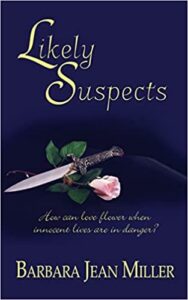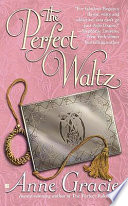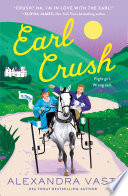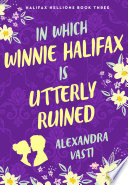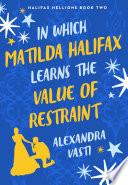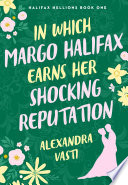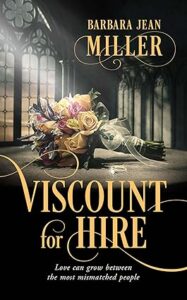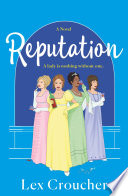 Reputation by Lex Croucher
Reputation by Lex Croucher Published by St. Martin's Griffin on April 5, 2022
Genres: Fiction / Romance / Historical / Regency, Fiction / Romance / Romantic Comedy
Pages: 320
Format: eBook
Buy on Amazon


Bridgerton meets Gossip Girl with a dash of Jane Austen, in Reputation, a Regency-era historical romantic comedy with a deliciously feminist twist, from a hilarious new British voice, Lex Croucher.
Abandoned by her parents, bookish and sheltered Georgiana Ellers is spending the summer with her stodgy aunt and uncle at their home in the English countryside. At a particularly dull party, she meets the enigmatic Frances Campbell, a wealthy member of the in-crowd who delights Georgiana with her disregard for so-called "polite society."
Lonely and vulnerable, Georgiana quickly falls in with Frances and her wealthy, wild, and deeply improper friends, who introduce her to the upper echelons of Regency aristocracy, and a world of drunken debauchery, frivolous spending, and mysterious young men. One, in particular, stands out from the rest: Thomas Hawksley, who has a tendency to cross paths with Georgiana in her most embarrassing moments. Sparks fly, but Thomas seems unimpressed with the company she is keeping. And soon, Georgiana begins to wonder whether she’ll ever feel like she fits in––or if the price of entry into Frances’s gilded world will ultimately be higher than she is willing to pay.
Set against a backdrop of lavish parties, handsome men on horseback––and in a time when one’s reputation was everything––this edgy, hilarious romantic comedy explores sex, consent, belonging, and status through the eyes of an unforgettable heroine that Austen herself would have cheered for.
More bildungsroman than romance, Reputation is advertised as Bridgerton mixed with Gossip Girl “with a dash of Jane Austen”. Bridgerton is likely being used as a proxy for “Regency”, but otherwise there are not many similarities. Admittedly, I have never watched Gossip Girl but I suspect its part of a tradition of stories of wealthy teenagers behaving badly ala Bret Easton Ellis, which this book had in spades. I have seen others reference Mean Girls, and there are certainly elements of this book that bear close resemblance..
In stories like Mean Girls and Bret Easton Ellis books, there is a romantic element, and indeed there is a HEA at the end of Reputation, but I am not sure what is interesting about it is the romance. And I also take issue with it being sold as a romantic comedy, for while there are a few comedic elements and staccato pace of television dramedies, I wouldn’t say much of the book is as funny as it is melodramatic.
Which sounds exactly as it should. An older woman’s take on a coming of age story.
Because as a younger woman, there is much I would have appreciated about this book. I went to a University where many of my classmates’ family wealth was staggering (Uni buildings named after them and elevators in their homes kind of wealth) and on the rare occasions I rubbed elbows with them, or even tried to keep up with them, it was readily apparent that they were in an entirely different league. Taking those sorts of sometimes painful but mostly embarrassing and bracing realizations into the realm of the excessive wealth and decadence of the Regency, and diving head first into the bacchanalian tendencies of the exceedingly wealth and titled is interesting, particularly when it is focused on the younger, unmarried population. These themes are why I enjoyed Bret Easton Ellis in my early twenties.
My experience with Reputation was very different than much of what I read now, mostly because Reputation centers so steadily on a brief infiltration of this ultra wealthy and debauched world by a definite outsider rather than the familiar structure of Regency Romance. And a younger me would have found it refreshing and relatable and somewhat soothing. Because, of course, I never belonged to those exalted heights but, as Reputation concludes (as do many Bret Easton Ellis books), those on pillars should really be pitied more than prized. And those experiences, experimenting with alcohol, drugs, and sex, are melodramatic at least when one’s life has been relatively sheltered, which is true for the heroine of Reputation.
And the unrestrained nature of how Croucher tackles these themes, like Easton Ellis, puts her very far away on any conceivable spectrum from Jane Austen. If you have spent time with me over the years, you will know that my absolute favorite Jane Austen is Northanger Abbey. Which is a book that has very similar themes to Reputation; a young woman thirsty for adventure on a trip with non-parental adults who assume a guardian role who stumbles upon an acquaintance that threatens to be her undoing. And a hero suffering his own history, eager to safeguard the naïve heroine from falling into disgrace. But though the themes are similar, the way they are handled is dramatically different and therefore an unfair comparison. I would not categorize Twilight as having a “dash of Bramstoker” anymore than I would recommend a mass market Regency as similar to a Georgette Heyer.
I get it, its marketing. And yes, I quibble a lot with the marketing of books. But its inherently dishonest to set up expectations by latching on a tremendously popular round peg and trying to hammer it through a square hole. In this case, a “dash of Mean Girls” would have been more accurate and probably sold more books.
Northanger Abbey is the closest comparison to Reputation, but misses some fundamental elements including satire. But more importantly, what should be compared is the romance.
Northanger Abbey is also very much a bildungsroman, although the romance is much more centered and part of the character arc for Cathy. Part of the satire is that Cathy builds a great romance around Henry when he isn’t that into her, at least at first. The reality of romance is part of Cathy’s growth, from a grand and terrifying thing, to a much more mundane, but still magical reality.
Reputation offers the romance as a reprieve from character growth; it is not the romance that challenges Georgiana or is “the making of her”. I suppose Thomas (hero) is meant to be a much less patriarchal figure than Henry Tilney of Northanger Abbey, and perhaps more sympathetic to a modern audience. I really liked how steady and kind and sensitive he was. But if he was written out of the story, it wouldn’t have made a significant impact, really. Because the true love moment in my opinion, the true HEA for Georgiana, was the way she not only found a true friend but also found love and support with her Aunt and Uncle. And that makes me question whether it really is a romance at all, or a coming of age story with a romantic element.
By contrast, Henry makes a significant sacrifice to be with Cathy, but also inspires her to recognize her own folly and force her to growth. Cathy must abandon her more melodramatic notions of romance to come to terms with the realities, both of her own situation and that of Eleanor Tilney.
At the end of the day, the romance was ultimately too underdeveloped to be the focus, and therefore I was not invested in the outcome. This is all to say that I really enjoyed this book, for all it is perhaps miscatalogued as a romance or romantic comedy.
And I want to say, that is okay. I like stories that end up in unexpected places, and perhaps are an opportunity for our own growth as readers and Cathy like experience of having romantic allusions shattered. But those have a place, and all romance readers agree, it’s not categorized under romance.
There are some tough bits to this book, including domestic violence, sexual assault, alienation and parental abandonment, grief, drug abuse, and a few violent scenes. There is only kissing on the page, although the SA perhaps takes it beyond the realm of kisses only readers.
I like reading broadly in the genre, even though I think this one was fringe Regency romance at best, but I know that is not the case for all readers. I think if you are not a devotee of the genre with an expectation about what “dash of Jane Austen” should look like and a mostly coming of age story set among a wealth and wild crowd piques your interest, then this book will be a match.
Depictions of this fast set and an exploration of what that might have meant for others is interesting stuff; how carelessly these young, entitled people regard those who depend on them for their livelihood, as evidence by a couple of scenes and “confessions” during a drinking game, is probably fairly accurate if not precisely a faithful re-enactment. I thought it was an interesting way to shine a light on how privilege tends to distance people from the realities of how most people live, and that even for all their wealth and privilege, they often seem to be very unhappy people (and thus to be pitied rather than prized).
However, if you are a reader who really wants the focus to be on the romance, or you want to read a familiar story with familiar tropes, skip this one. I also read some reviews that were fairly agitated about “historical accuracy” mostly from an etiquette or mores perspective which I honestly should consider doing a Representing Regency post about (please leave a comment if that is something of interest, because it’s probably a dissertation worth of research that I would hate to commit to if readers won’t find value in it).
Finally, I want to acknowledge this author for featuring both LGBQTIA+ and ethnic minority (I am using this term intentionally https://www.theguardian.com/commentisfree/2021/apr/08/bame-britain-ethnic-minorities-acronym and https://www.ethnicity-facts-figures.service.gov.uk/style-guide/writing-about-ethnicity) characters in a way that felt authentic, if sometimes clumsy. I think often we applaud white authors for their earnest efforts to not “white-wash” (Croucher used this term in her author’s note) their historical novels, but I also think those efforts can be fraught with unintended problems. I saw some in Reputation; for instance, naming the ethnicity or skin color of ethnic minority characters when you don’t do the same for white characters (Writing Characters of Color: How to Avoid Being Racist (bookriot.com))
It also seemed like most of the ethnic minority characters and LGBQTIA+ had really sad lives. I remember reading about Schitt’s Creek deliberately creating a space free of homophobia to strengthen the message of love and tolerance, and how much it struck me that this, along with the general kindness of the show, is what made it so comforting and funny for me. I realize it’s a hard choice. On the one hand, no one wants to negate the pain and struggle for marginalized people. But it’s also important that in world building we don’t retraumatize people for the sake of accuracy or some other impulse, particularly if we are trying to write outside of our own experience. I am not an expert voice on these issues, but I did want to raise them so readers are aware and can make their own decisions about what might be harmful to them.
At the end of this review, you will perhaps find my rating surprising when coupled by my criticism. But I genuinely did enjoy this book, if for the interesting take on a coming-of-age story and not for the romance. While the focus of this blog is Regency and that generally involves Regency Romance, not all the books I have reviewed are romance. I felt this was a great example of utilizing the Regency era, and its many tropes, in a fresh, new take of the bildungsroman.
If you read Reputation, please share your comments and takes below as I am interested if other Regency Readers had a similar or different experience.

